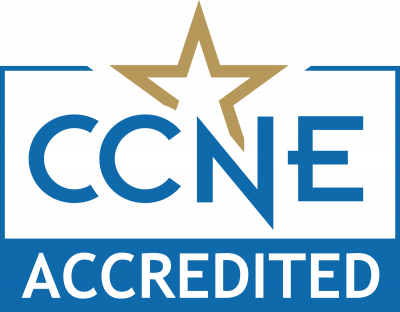
Ten years ago, Sandra Bellini, DNP, APRN, NNP-BC, CNE, and the other faculty members who lead UConn School of Nursing’s neonatal nurse practitioner program took a leap of faith.
They explored other neonatal programs across the country and realized they were losing students to online programs, which were easier for working nurses to fit into their busy schedules and complete from home. Therefore, Bellini and her team, with full support from the School of Nursing and UConn’s Center for Excellence in Teaching and Learning, moved the School’s neonatal master’s concentration fully online.
“We went online in 2013 completely intertwined with the eCampus team at CETL,” says Bellini, who directed the program up until August. “We could not have done any of this without them. Every course in the program was designed by a neonatal faculty member and someone from eCampus. It definitely was a leap of faith for both sides.”
Now, 10 years later, the program is ranked as the No. 8 online nursing master’s program in the country, according to U.S. News & World Report, and is one of the five largest neonatal programs in the U.S., with approximately 92 students currently enrolled.
“I commend Dr. Bellini and the other neonatal faculty for their program’s incredible success,” says School of Nursing Dean Deborah Chyun, Ph.D., RN, FAHA, FAAN. “Their dedication and their students’ hard work made this well-deserved recognition possible. All of us at the School are proud of their accomplishments and offer our heartfelt congratulations.”
It was not an easy road to success, however. Bellini recalls that the program was on the brink of extinction when her team began planning the switch to online.
“We knew that neonatal nurse practitioner education elsewhere had gone online in the mid- to- late 1990s,” she says. “We were very aware that we were coming into something really late in the game and that, if we wanted to be successful, we were going to have to go well above and beyond what our academic competitors were doing. And that was just in order to exist and keep our heads above water.”
Bellini, along with fellow faculty members Mary Whalen, DNP, NNP-BC, APRN, and Michele Beaulieu, DNP, APRN, NNP-BC, admitted eight students in that first online cohort in August 2013. The three educators had met while studying in the same Doctor of Nursing Practice program years before and knew the fate of UConn’s neonatal program was in their hands.
“I said to my teammates, ‘This is go big or go home because we are going to lose the program if we cannot make it successful,’” Bellini says.
So, they went big. Their original goal was to admit eight students every other year. But after that pilot cohort finished the program in 2015-2016, the number of applicants they received continued to climb. Between 2016 and 2020, the cohort sizes went from eight every other year, to 16 every year, then stayed at 24 annually for a couple of years, and finally capped at 32 annually, which is where Bellini says it will remain.
“I believe prospective students come to UConn because they have heard students and graduates say that the program is big enough to have a serious, respected national reputation, but at the same time it is small enough that they know the faculty and other students, the faculty know them, and they do not lose that concierge kind of service,” she says.
The program’s growth and quality engagement with students is reflected in its robust national reputation. In the past three years alone, the program’s U.S. News & World Report ranking has climbed from No. 82 to No. 14 and now stands at No. 8. It is an honor that Bellini says would not have been possible without support from CETL and the School of Nursing.
In creating its rankings, U.S. News focuses on five categories: student engagement with classmates and instructors; faculty credentials and training; opinions from academic officials in nursing; services and technologies offered; and student excellence.
“We love our students,” Bellini says. “The reputation of the program among prospective students is that you are going to work really hard in this program, but you will never feel like you are doing it alone and you will never feel unsupported by the faculty.”
Because of that faculty support and the quality of the program, students who graduate do exceptionally well on their National Certification Corporation exams. In 2021, 100% of program graduates who completed the exam passed.
“I do not believe any of us predicted just how successful the online neonatal program would be,” Chyun says. “Its impact goes beyond its national acclaim and students’ success. It has also led the way for our other master’s program concentrations to move online and reach many more students.”
In the fall of 2021, the five other master’s concentrations offered by the School of Nursing—adult gerontology acute care nurse practitioner, adult gerontology primary care nurse practitioner, family nurse practitioner, nurse educator, and nurse leader—completed the transition to fully online learning.
“The other master’s program tracks are going to do well,” Bellini says. “The University and School are there to support them, we have phenomenal subject matter experts teaching the other tracks, and their partnership with CETL and eCampus, just like ours, will make all the difference.”
At the end of the 2021-2022 academic year, Bellini stepped down as director of the neonatal program and both she and Whalen changed to a part-time teaching schedule. Faculty member Valarie Artigas ’17 DNP, APRN, NNP-BC, who joined the program in 2020, has taken over as director and has hired full-time educator Tiffany Gwartney, DNP, APRN, NNP-BC.
“Directing this program has been one of the most challenging, yet fun, things I have ever done professionally,” Bellini says. “If you have the right people with you, you can make it happen. Now it is a mature, well-established program and it goes to Dr. Artigas for its next chapter.”
Regardless of how the program’s future unfolds, the past 10 years have led its faculty to discover an equation for success: collective vision, teamwork, attention to students, and the courage to take a leap of faith.
This article was originally published in the Fall 2022 issue of Unison.

